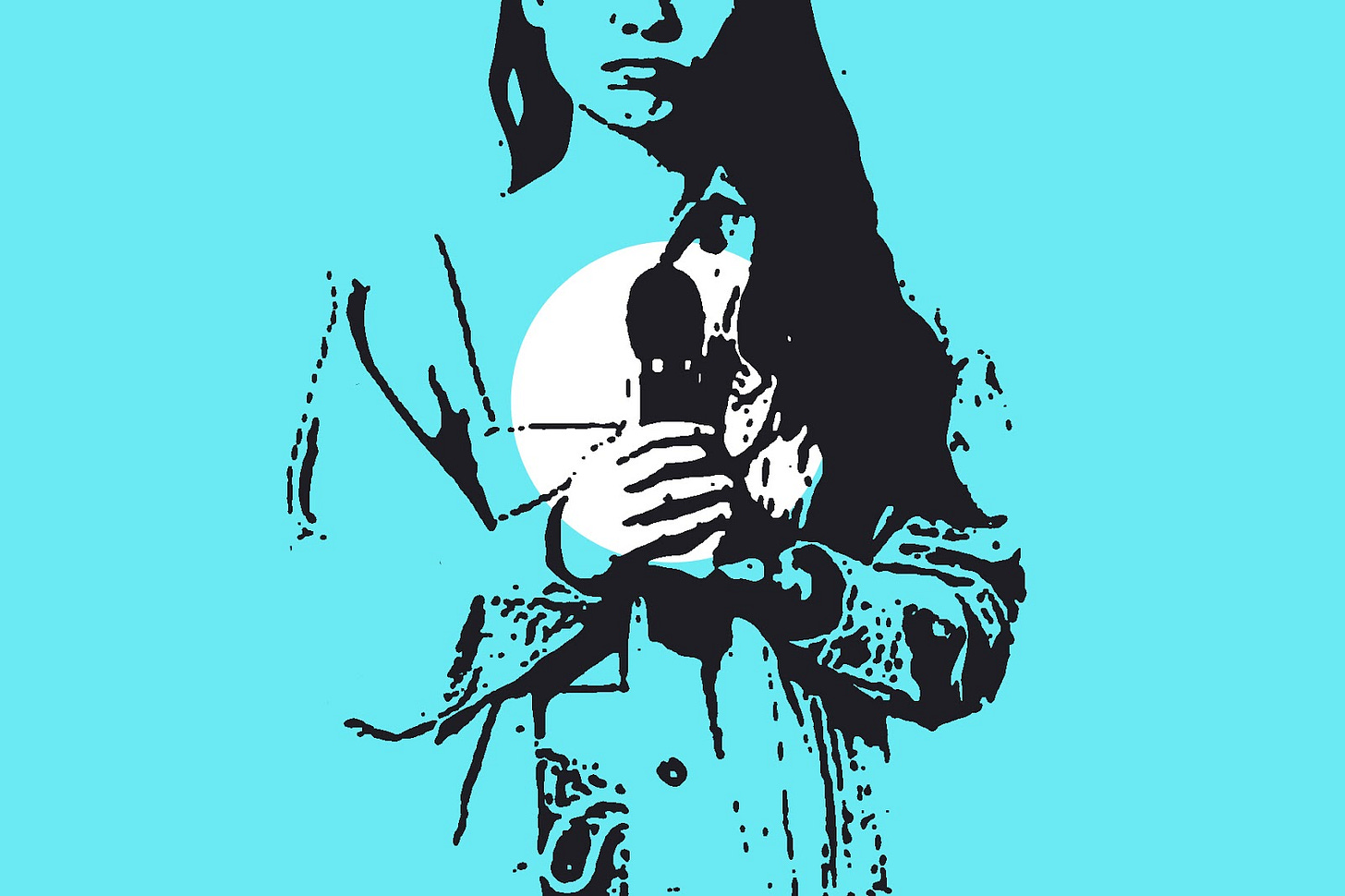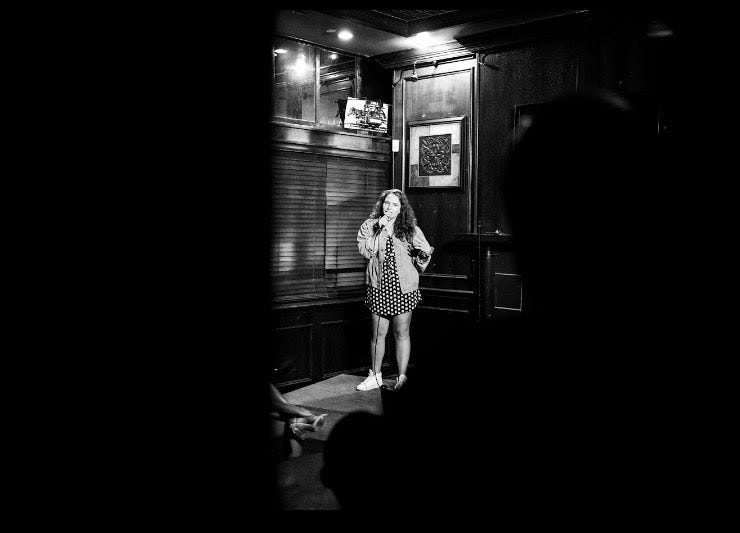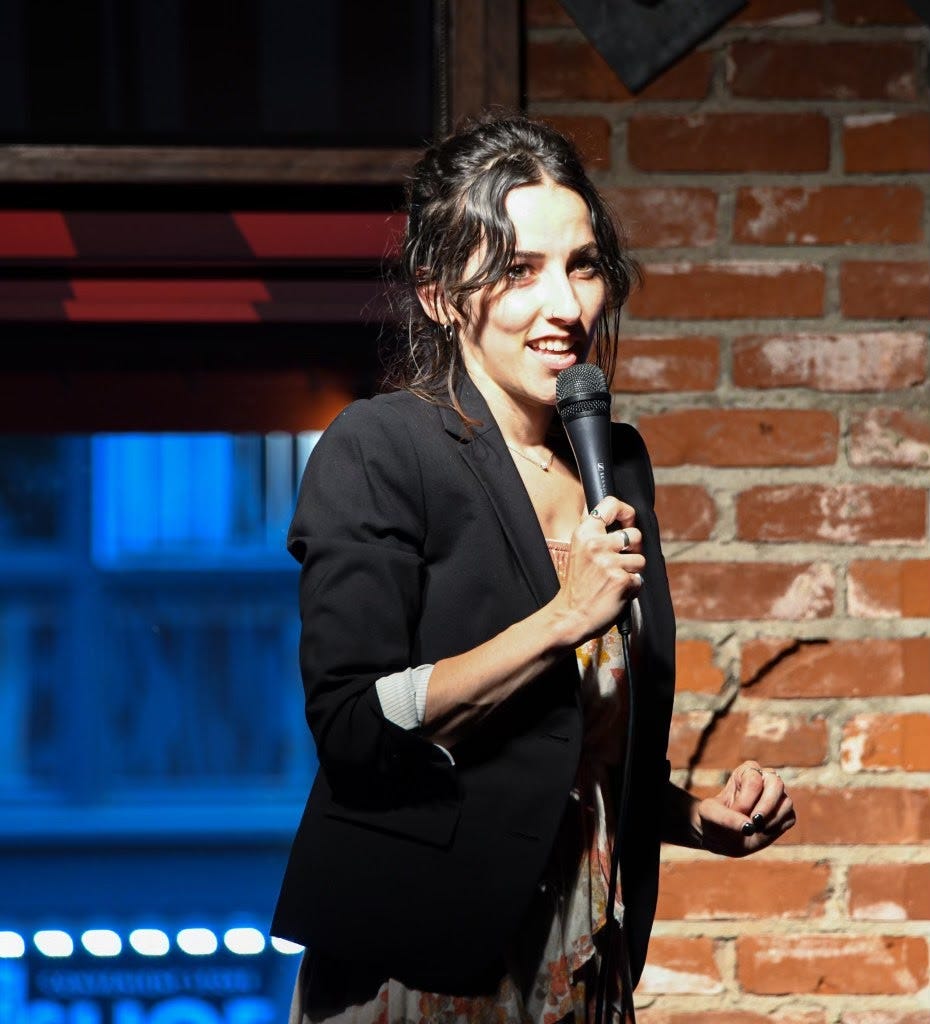“The next comic coming to the stage has a vagina”
A guest post by writer/comedian Ombretta Di Dio on returning to the open mic stage, and the post-pandemic efforts to make San Diego’s stand-up scene more friendly to women
It’s not that I necessarily wanted to go back to open mic comedy. Sure, I’d had the itch here and there over the past couple of years, but standing on a stage with a microphone in my hand on a Wednesday night hadn’t exactly been at the top of my priorities since 2019, at least. And although I hadn’t performed since then, I still remembered how a typical open mic crowd can be: tired, drunk, mentally—and sometimes even physically—absent.
Open mic comedy can leave performers physically and psychologically drained, but talk to anybody who has done any comedy at all, and they’ll say that the mic has a way of luring them in when they feel at their most vulnerable—in my case, when my three-year relationship ended during lockdown.
As a woman at an open mic comedy show, I can’t say I’ve missed watching dude after dude talk about their penis for hours on end, all while thinking about how I have to wake up early the next morning to make it to my 9-to-5. At the end of the day, comedy doesn’t pay the bills, but the lure of the mic is real.
Comedy has the ability of charming and disappointing all in the span of one night. It tosses comics to the side just to pull them back in. In a way, it’s like that ex-boyfriend who is almost impossible to get over.
This is probably the last time, I tell myself every time I perform. What’s the point of doing this anyway? Will any good ever come out of this?
(Whether I am still talking about comedy or my relationships remains a mystery.)
Yet, here I am again. It’s a Wednesday night. Everything at the club looks the same: the stage, the crowd, the dark light, the “shhh” of the door person reminding people to shut up. It’s all just as I recalled. Except it’s not, because the open mic scene is changing and shifting every few years, with old timers quitting and fresh faces constantly popping in.
I immediately notice those new names on the list of comics who signed up for the mic that night, and while I recognize a few of the guys, none of the women are familiar. There are less than a handful here tonight, and that hasn’t changed at all. In my experience, I’ve noticed women don’t stick around in stand-up.
Looking around, I see a group of them sitting at a table, notebook in hands. I introduce myself, and ask what their deals are.
The first is Kylie Troop. She is a regular at Mad House Comedy Club on Fourth Ave. She has an endless smile and a head full of red curls. She addresses her Irish heritage on stage. The audience likes her, and so does everybody else. She moved to San Diego four years ago, she tells me, and she just got her master’s in ecology from SDSU. But none of that matters much now, she says. She doesn’t see herself working behind a desk forever. Eventually, she wants to become a full-time road comic.
“I think it’s doable if you put the work in,” she says. “Hopefully, I’ll get seen by a good headliner who will take me on the road.”
The road, of course, is the dream for many open mic comics. According to Matt Stanton—who has been on the road for 16 years and has performed with the likes of Lewis Black and Daniel Tosh—the road is anywhere you can find a room full of strangers.
“When you can make a wide audience laugh, that’s when you are ready for the road,” Stanton says.
It was the Marvelous Mrs. Maisel—a TV show about a housewife in the ‘50s who discovers a knack for stand-up—that inspired Troop to try comedy for the first time, but it was the inviting environment that convinced her to stay.
As she talks, I can’t stop thinking about how different this is from the open mic scene I am used to.
“When I first started [during the pandemic], everybody was so supportive,” Troop says.
“Even the ‘boys of comedy’?” I ask, referring to the dudes who had been sticking around open mics for more than a decade when I started in 2015.
She tells me that everybody has been incredibly welcoming, and she feels especially safe at Mad House because the whole staff is now fully committed to making it an encouraging environment for young women.
I ask Dave Callans about that. Callans books shows at Mad House. I have known him since I started, and I know he’s been on stage millions (thousands?) of times for the past 15 years.
“Unfortunately, stand-up is still treated like a boys’ club at a lot of places,” Callans says. “Women often feel unwelcome or even unsafe. In all my time doing [comedy], there’s always been an enormous imbalance of men and women. To encourage women to try it and stick with it, we put them [on stage] early, while people are still in attendance.”
Callans is right. I have been emailing Mad House every Sunday, asking to sign up for the following week’s open mic, and so far, I have always stepped foot on stage within the first hour of the show, when the crowd is still alert. Incidentally, this works well with my job. And with my fear of being jumped while walking back to my car late at night.
“Women don’t get booked as much, or paid as much, or provided the same opportunities in comedy,” says Robert Lariviere, owner of Mad House. “And one of the reasons is that it’s very hard for women to break in at a ground level, so my first goal is to make women feel safe and comfortable. I want to flood the scene with as many female comics as possible from the get-go.”
I ask him if people are upset about that.
“If male comics feel discriminated, they can personally call me,” he says. “I don’t care...I think fixing this problem is actually also good for men. It’s not good to have an all-boy type of comedy. You need diverse materials.”
In any case, Kylie Troop doesn’t mind being around men all that much. She was in the men’s soccer team growing up, she says, and she likes how guys tend to constantly roast each other.
I know exactly what she means, I think a few weeks later, when some dude outside the club asks me whether I am autistic because I have an Italian accent.
But being a woman in comedy is still not all fun and games. At least, that’s what Katelyn Attard, 29, tells me. Attard started four years ago before briefly moving to Los Angeles to pursue a career in writing.
“I would like to write for SNL eventually,” she says.
While in LA, Attard dressed up as Marilyn Monroe on Hollywood Boulevard, auditioned for a few roles, and was starting to score spots on stand-up showcases before the pandemic hit. That’s when she returned to San Diego.
“With guy comedians, you are always the new girl,” she says. “And sometimes you become a threat. Sometimes they will call you ‘lady comic’ and, if you are cute, they will doubt that you are even funny.”
Even so, Attard wouldn’t change this comedy thing for the world. She says she was able to find the right support from the right people. She has a sketch group, and sometimes she “grinds,”—a term for trying to get on stage as much as possible on any given week—and sometimes she doesn’t, but she will never ever give up her dreams. She says the end goal is still LA, and maybe even the road. Why not?
For some of the new women, their comedy careers began in San Diego. That’s the case for Eleanor Repass, 29, who moved from New Orleans, where she spent more than half a decade stripping, to San Diego in 2018.
“I was tired of failure,” Repass says. “I needed growth...I picked up acting for two years, and during one of my acting classes I thought, ‘I really want to make people laugh.’”
Repass started coming to Mad House right before COVID, and she was later hired as a server, which gives her the chance to be around comedy pretty much all the time. I ask her if she hopes to make a career out of it, and she tells me that money is not the ultimate goal. Laughter is. She wants to give people joy, make them forget about their troubles for a while.
I wonder whether my self-deprecating humor can heal people. Probably not. But in the meantime, I’ll take the laughs and the stage time.
Ombretta Di Dio will be doing stand-up at The Tavern in Mission Valley this Saturday, August 7th at 7 p.m. Don’t miss it.
THE WEEKLY GOODS
Go to this
Heavy Hawaii is one of those bands that simultaneously bask in the San Diego sound while also subverting it. Their brand of lo-fi, fuzzed-out rock is the perfect soundtrack to getting high and drinking cheap Miller High Lifes in the sun, but there’s also an underlying tinge of Lynchian darkness to keep things interesting. This Friday at 9 p.m., the band is performing at Whistle Stop, and I imagine they’ll be playing some of the very fine songs off their scuzzy/dreamy 2020 album Boy Don’t Drown. I’m always down for a side of weird vibes to go with my good vibes, and Heavy Hawaii delivers.
Usual caveat for going to shows: Delta’s raging. If you’re unvaccinated, stay home. If you’re vaccinated, bring a mask. Just don’t be an asshole, okay?
Read this
Last week, I read a lot of retrospective articles celebrating the 25th anniversary of Sublime’s self-titled album (including this good one by Alex Zaragoza). The consensus seems to be ”Actually, Sublime is good,” to which I’ll say: Hmmmm. I’m not going to get all rose-tinted misty over a bro band that jokes about date rape, but I can’t deny how important that album was to me in middle school. But also, let’s not forget that I was having Sublime epiphanies a year before Big Media was doing it! Early last year, I wrote a PACIFIC Magazine article called “Does Weed Make Sublime Sound Good?” which—despite the flippancy of the title—tried to give the much-derided band (at least by music snobs) a fair shake. Is this really something worth flexing on? In fact, does pointing this out make me seem like a bigger loser than every sunburnt bro who’s ever busted out an acoustic cover of “Santeria” during a party? Of course it does! But you know, life is too short so love the one you got cuz you might get run over or you might get shot. (sorry, sometimes writing endings to things is hard).
Peep this
I’m not watching the Olympics. This is MAINLY because it seems incredibly irresponsible to hold the games during COVID and DEFINITELY NOT because I don’t know how to watch it without cable and also have no desire to pay the nominal fee to watch it on Youtube. That said, I’m a little sad to miss out on the sports that you don’t see on TV often—stuff like handball, table tennis and, um, horse dressage. Earlier this week, I was in a friendly little photoshop contest with some buddies (“You ‘Shop, Bro?” is a regular feature on Polyester Blend, the Youtube show I guest star on every Monday night), and our prompt was “Rejected Olympic Sports” and here’s mine. It’s called Cargo Shorts Stuffing, and that’s me winning gold.
What would your rejected Olympic sport be? Sound off in the comments or just maybe think about it and keep it to yourself (as I should’ve done).
Got a tip or wanna say hi? Email me at ryancraigbradford@gmail.com, or follow me on Twitter @theryanbradford. And if you like what you’ve just read, please hit that little heart icon at the end of the post.







